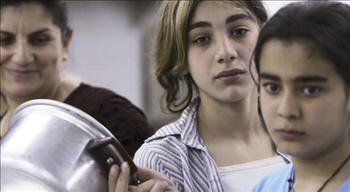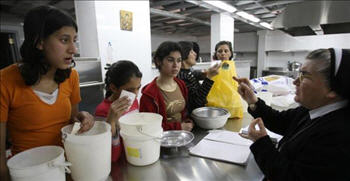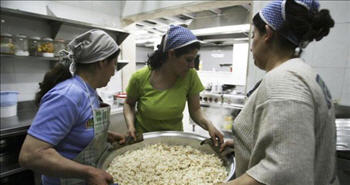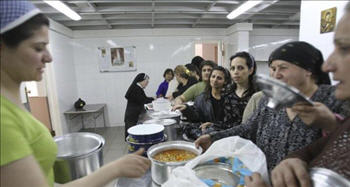

 Jaramana, SYRIA -- The conditions in Iraq are vastly improving, but ignored in the up-beat news of Iraq's road to recovery is the struggling plight of Iraqi Christians that remain targets and disenfranchised minority. Iraqi refugees throughout the region have become increasingly desperate. Despite a decline in violence in Iraq, only a small number have gone home, often because their resources are exhausted. Of those who returned to Iraq, many found their property occupied and suffered secondary displacement.
Jaramana, SYRIA -- The conditions in Iraq are vastly improving, but ignored in the up-beat news of Iraq's road to recovery is the struggling plight of Iraqi Christians that remain targets and disenfranchised minority. Iraqi refugees throughout the region have become increasingly desperate. Despite a decline in violence in Iraq, only a small number have gone home, often because their resources are exhausted. Of those who returned to Iraq, many found their property occupied and suffered secondary displacement.
The international community has been largely in denial over the disastrous humanitarian situation in Iraq, and has until recently seen Iraq through the prism of reconstruction and development, and failed to address urgent needs. Only recently has the United Nations issued a common humanitarian appeal for Iraq, recognizing the nature of the situation and the need for all agencies to address humanitarian needs. Nonetheless, the call by the U.N. remains largely ignored.
The vulnerable displaced Iraqis who have fled their homes for safer locations are unable to access their food rations and often unemployed, they live in squalid conditions, have run out of resources and find it extremely difficult to access essential services. "The US, the government of Iraq and the international community must begin to address the consequences of leaving Iraqis' humanitarian needs unmet," says Talal Lazar, a Chaldean advisor to the Jordanian embassy on Middle Eastern Christians.
As a result of the vacuum created by the failure of both the Iraqi Government and the international community to act in a timely and adequate manner, individuals will play a major role in providing assistance to vulnerable Iraqis.
Non-Governmental Organizations (NGO) and charitable groups have tried to ease the burden of refugees while the international community gets their act together. The Adopt-A-Refugee-Family organized by the Chaldean Federation of America (CFA) headquartered in the United States has been leading efforts to raise desperately needed support for vulnerable and displaced families.
Adopt-a-Refugee-Family Chairman Basil Bacall of Michigan has worked tirelessly in securing support for Iraqi families. The group has received the highest review and award for being an efficient and effective charity. Their effort has led to the adoption of over 5,000 refugee families receiving monthly food and welfare stipends.
The Adopt-A-Refugee-Family website states that families are facing religious persecution, kidnappings and murder; hundreds of thousands have been forced from their homeland into neighboring countries. There they live a squalid existence, unable to work legally and send their children to school. Some mothers have turned to prostitution in a desperate attempt to keep their children fed.
The program, launched in September 2007, allows concerned Americans to directly help Iraqi refugees. Thanks to an anonymous benefactor who pays all administrative costs, the CFA guarantees that 100% of donations go directly to the family.
Groups have pulled resources together to adopt families like first-grade school children, a church group, a bowling league, and businesses. A group of concerned Chaldeans hosted an entire poetry event where all the proceeds were to go towards helping the adoption of refugee families.
 Chairman Bacall says more can be done. Iraq remains a deeply violent and divided society. Faced with one of the largest displacement and humanitarian crises in the world, Iraqi civilians are in urgent need of assistance.
Chairman Bacall says more can be done. Iraq remains a deeply violent and divided society. Faced with one of the largest displacement and humanitarian crises in the world, Iraqi civilians are in urgent need of assistance.
Since the beginning of the crisis, the Government of Iraq has proven to be unwilling and unable to respond to the needs of vulnerable Iraqis. Although it has access to large sums of money, it is divided along sectarian lines, lacking both the capacity and the political will to use its important resources to address humanitarian needs. As a result, the government does not have any credibility left with Iraqis.
Ongoing violence in Diyala and Mosul, as well as recent events in Basra and Baghdad, have proven that the situation in Iraq is still too unstable and violent for people to return home. Of those Iraqis who have returned from Syria, most were unable to go back to their homes, as they would likely be attacked again, and had to move into homogenous, sectarian areas. Others found their homes occupied, and were unable to recover them.
 While everyone hopes that Iraqi refugees and internally displaced people will be able to return to their homes in the future, the necessary conditions for returns to take place in safety and in dignity do not exist.
While everyone hopes that Iraqi refugees and internally displaced people will be able to return to their homes in the future, the necessary conditions for returns to take place in safety and in dignity do not exist.
The major government bodies remain paralyzed to act. "For those of us who opposed the war in Iraq, this is our chance to help. As Americans we have a responsibility, even if our government is too confused to act. People are in desperate need of help and we are partly to blame for their condition. We used their homeland as a battlefield," says Andy Cartwright of Royal Oak, Michigan. "I tell my friends, if you are really against the war then do something about it. Adopt a family and show them that we are not just some political group trying to use the war to get our party into office."
 The Adopt-A-Refugee-Family program advocates have been reaching out to American citizens asking them to help with humanitarian efforts. "We have just started approaching small groups and schools asking them to adopt a refugee family," says Danny Naoum, a Chaldean engineering student at Wayne State University in Michigan. "My college professor, who is Chaldean, asked me and my friends to help lead an effort to start raising funds for the Adopt-A-Refugee-Family. We are asking student organizations and reaching out to schools, community clubs, and other groups to get involved."
The Adopt-A-Refugee-Family program advocates have been reaching out to American citizens asking them to help with humanitarian efforts. "We have just started approaching small groups and schools asking them to adopt a refugee family," says Danny Naoum, a Chaldean engineering student at Wayne State University in Michigan. "My college professor, who is Chaldean, asked me and my friends to help lead an effort to start raising funds for the Adopt-A-Refugee-Family. We are asking student organizations and reaching out to schools, community clubs, and other groups to get involved."
In the small church in Jaramana, Syria, Iraqi refugees clamor for food and shelter. Unable to work or feed their families, Chaldean women hurry into the kitchen to eat and secure dried beans and rice to take home to their families.
Refugees residing in the Jaramana camp in Syria, like the other 5,000 refugees living in the official camp--as well as the nearly 17,000 living outside in an unofficial camp--endure overcrowded housing, poverty and limited work opportunities.
 Groups like the Adopt-A-Refugee-Family help provide funding for food pantries in Syria and Jordon for refugees. These services constitute a central resource for most refugee families in Syria, which they have no means of replacing.
Groups like the Adopt-A-Refugee-Family help provide funding for food pantries in Syria and Jordon for refugees. These services constitute a central resource for most refugee families in Syria, which they have no means of replacing.
The churches look to the charity of compassionate faithful throughout the world to assist the refugees. The church in Syria offers their facilities and resources as distribution centers and free medical care facilities as well as safety centers for vulnerable women and children refugees. What were once halls of worship have mostly turned into emergency care centers.
However, the church still keeps candles lit before the altar to provide spiritual rest and relief for the parents and their families seeking solace. In the few quiet moments, when the cries of women and children fighting pains of hunger or despair die down, prayers are sung for mercy echo off the walls and up to the heavens.
www.chaldean.org

or register to post a comment.